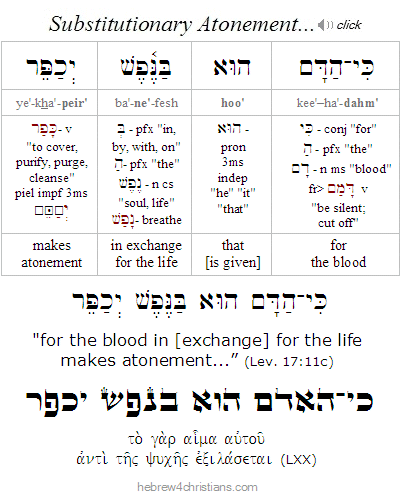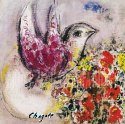|
Though the gift of human life (i.e., conception / birth) is rightly regarded as one of the greatest events in the world, the Torah states that it begins in impurity (טֻמְאָה), indicating that natural life by itself is insufficient for attaining spiritual life (John 3:7). Hence we read in our Torah portion that the birth of a child results in impurity for the mother that required blood atonement (Lev. 12:2, 7). A new mother is treated as a niddah (a menstruent woman) and is considered impure (i.e., tamei, טָמֵא) for 40 days (if a boy) or 80 days (if a girl). Only after making an offering of blood (a lamb, a young pigeon, or a turtledove) was she declared "clean" (טָהֵר). This was also true of Miriam (i.e., Mary, the mother of Yeshua) who fulfilled her "days of purification" and offered the prescribed sacrifices according to the law (Luke 2:22-24).
The Torah makes it clear that blood (דָּם) is used as a means of consecration as well as a means of obtaining atonement (כַּפָּרָה) with God. Blood was used on the doorposts of the houses in Egypt to ward off judgment and was later used to ratify the covenant given at Sinai (Exod. 24:8). All the elements of Mishkan (Tabernacle) were likewise "separated" by its use: The altar, the various furnishings of the Temple, the vestments of the priests, and even the priests themselves were sanctified by blood (Exod. 29:20-21, Heb. 9:21). But ultimately blood was used to "make atonement" for the soul upon the altar. As the Torah (Lev. 17:11) plainly states: "For the life of the flesh is in the blood (כִּי נֶפֶשׁ הַבָּשָׂר בַּדָּם), and I have given it for you on the altar to atone (לְכַפֵּר) for your souls, for it is the blood that makes atonement by the life (כִּי־הַדָּם הוּא בַּנֶּפֶשׁ יְכַפֵּר)." Blood is therefore connected to the holiness of life through sacrificial death....
The Scriptures teach that the "wages of sin is death" (Rom. 6:23, 1 Cor. 15:22) and the soul that sins shall die (Gen. 2:17, 3:19, Ezek. 18:4, 20). Sin is a source of lethal spiritual contamination or defilement. The holiness and justice of God requires that sin be punished by death, and death is represented by the shedding of blood. However, the system of animal sacrifices and blood rituals provided in the Mishkan was meant to "atone" for sin (i.e., restore the broken relationship with God) by means of identifying with the death of a vicarious substitute. With regard to the chatat ("sin offering") or asham ("guilt offering"), the worshipper would bring a kosher animal (korban) to the entrance of the Mishkan and place both his hands on the animal's head, leaning on it to identify it with himself (Lev. 4:29). This act of "semikhah" (סְמִיכָה) symbolically transferred sins to the sacrificial animal. Then, the offerer himself would slay the animal and confess that his sin caused the innocent victim to be slain in his place (Menachot 110a). This is the "life-for-life" principle: God accepted the sacrificial substitute in place of the offender based on his faith..
In our Torah portion, a person who was declared a metzora (i.e., a "leper," or one suffering from tzara'at) must be sent "outside the camp." He was an outcast and treated like one who had been sentenced to death. He would tear his clothes, cover his face, and cry out, Unclean! Unclean!" so that no one would be defiled through contact with him (Lev. 13:45-46). For the metzora to become purified, he likewise had to undergo examination outside the camp and then undergo a ritual that bears some resemblance with the Yom Kippur ritual performed on behalf of the nation (the scapegoat bird, the scarlet thread). In a way, the purification of the metzora was like that of anointing the priests: blood from the asham (guilt) offering would be sprinkled on his earlobe, thumb and foot (Lev. 14:14). The shaving of his hair and his immersion in water (mikveh) was like being reborn or brought back from the dead (Lev. 14:9). Both blood and water are symbols of cleansing in the Torah, just as they are in the New Covenant of Yeshua (John 19:34).
The Bible is described as a "book of blood and a bloody book." In the Torah, just as in the New Testament, sacrificial blood is connected to atonement and the forgiveness of sin (Heb. 9:22). Blood is the means by which spiritual uncleanness (tumah) - the defilement caused by sin and death - is removed from us. However, unlike the blood rituals of the Tabernacle which functioned as "a copy and shadow of the heavenly things" (Heb. 8:5), the sacrifice of Yeshua has "perfected for all time" those who are being sanctified (Heb. 10:4, 11-14). All the sacrifices offered in the Mishkan (and Temple) anticipated the greater sacrifice of Yeshua Himself (Heb. 9:23-26). We go "outside the camp" to the Cross and there confess our sin, understanding that we are "spiritual lepers" under sentence of death. By faith we "lean our hands" upon the head of Yeshua, accenting that He is our sacrificial substitute before the Father. We trust in the divine "life-for-life" principle of Yehua's life given for us... We "lean into Him," meaning we trust in His sacrifice and abandon our sins with Him...
"Come now and reason with the LORD. Though your sins are as scarlet, they can be made white as snow..." (Isa. 1:18). The blood of bulls and goats could never fully remove our sins since they did not represent the very life of God poured out on our behalf (Heb. 10:4). God chose the ultimate "cleansing agent" for sin by shedding the precious blood of His own Son for the sake of our atonement (1 Cor. 15:3-4; Rom. 5:11). The blood of Yeshua truly cleanses us from the stain of our sins (Heb. 10:12-14). We make "spiritual contact" with the sacrificial blood of Yeshua through faith -- by being "baptized into His death" and identifying with Him as our Sin-Bearer before God. We then are delivered from the law's verdict against us and accepted into the Kingdom of God (Rom. 4:25; 2 Cor. 5:21; Col. 1:13-14, 2:10-15).
"The law made nothing perfect, but through a better hope we now draw near to God" (Heb. 7:19). The blood of our Messiah Yeshua is called the "the blood of the everlasting covenant" (דַם בְּרִית עוֹלָם) that cleanses us from our sins (Heb. 13:20, 1 John 1:7). The Cross represents the "Mercy Seat" (Kapporet) that covered the ark in the Holy of Holies made without hands. It is interesting to note that the word used in the Greek Septuagint to translate the Hebrew word kapporet ("cover") is hilasterion (ἱλαστήριον). The New Testament picks up this usage in Romans 3:25: "God put forward Yeshua as a propitiation (ἱλαστήριον) through faith in His blood." In other words, the sprinkling of Yeshua's blood - represented by His Passion upon the cross - was "presented" upon the Heavenly Kapporet, before the very Throne of God Himself.
Because of Yeshua, we now have access before the Throne of God Himself (Heb. 4:16). All glory be to Yeshua our Savior, "the faithful witness, the first-born of the dead, and the ruler of the kings of the earth. To Him who loves us, and released us from our sins by His blood" (Rev. 1:5). "Worthy are you to take the scroll and to open its seals, for you were slain, and by your blood you ransomed people for God" (Rev. 5:6-9).
 |
|



